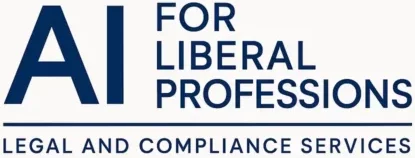Helping Professionals Adapt to AI Legally and Ethically
WE HELP LIBERAL PROFESSIONS FACING CHALLENGES POSED BY ARTIFICIAL INTELLIGENCE TO COMPLY WITH LEGAL, ETHICAL AND REGULATORY REQUIREMENTS
AI reshapes liberal professions
Artificial intelligence is reshaping the daily practice of liberal professions. Innovation is inevitable — but it must not come at the expense of ethics, autonomy, or professional integrity.
The road to compliance
This platform explores the key challenges posed by the EU AI Act for liberal professionals. It explains how FRIA (Fundamental Rights Impact Assessment) may apply to certain professions, and introduces our AI-VIALP (Voluntary Impact Assessment for Liberal Professions) — a dedicated governance tool to help assess, anticipate, and document AI-related impacts on professional practice.
What we offer
Because the law doesn’t say everything — and because trust is the cornerstone of all liberal professions — we offer legal and strategic guidance tailored to your professional reality. Our team of lawyers and academics, experts in AI regulation and legal ethics, provides clear, actionable support in navigating this new regulatory and ethical landscape.
Welcome to our website
Liberal professions are being transformed by invisible forces: AI tools that draft, suggest, triage, diagnose.
These tools are often embedded, non-transparent, and poorly governed.
Yet the core of liberal professions’ work is relational, ethical, and grounded in trust.
AI introduces new asymmetries, accelerates processes, and dilutes professional discretion.
Without a structured response, liberal professions risk leaving their ethical foundations behind. The question is no longer whether to use AI — but how to do so responsibly.

AI-VIALP : a new method for liberal professions compliance
Context Definition and Risk Mapping
Identify the specific activities involving AI within the liberal profession, assess their purpose, scope, and link to professional duties and values. Map associated ethical, legal, and technical risks.
Stakeholder and Impact Identification
Determine who may be directly or indirectly affected (clients, patients, colleagues, authorities). Anticipate foreseeable impacts in light of the professional’s duties, rights, and social function.
Legal and Ethical Framework Review
Analyse applicable legal norms (e.g., GDPR, AI Act, professional codes of conduct) and ethical principles. Highlight areas of uncertainty or possible tension.

The AI Act does not speak about liberal professions. But liberal professions should deal with it.
Artificial Intelligence is reshaping how liberal professions operate — from law and healthcare to engineering and consulting. While AI offers unprecedented opportunities to enhance efficiency and productivity, it also raises serious legal, ethical, and professional challenges.
The EU AI Act introduces a risk-based framework that doesn’t only target AI developers: users — or “deployers” — are also subject to specific obligations, especially when using high-risk systems. Liberal professionals, often working autonomously and handling sensitive data, are particularly exposed to these new requirements.
Contact us
We will reply you within 24 hours by email, or you can call us directly. We are always ready to serve you.
By phone
Anthony Bochon
+32.(0)2.616.06.30
By email
Response within 24 hours
contact@bochonpartners.com
Our cabinet
IT Tower (11ème étage)
Avenue Louise 480
1050 Bruxelles, Belgique

